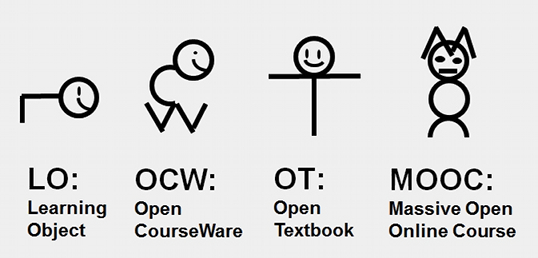A Message from the MERLOT Executive Director
MOOCs, MERLOT, and Open Educational Services
|
Gerard L. Hanley
Senior Director, Academic Technology Services
Executive Director, MERLOT
California State University, Office of the Chancellor
Long Beach, CA 90802 USA
ghanley@calstate.edu
The appearance of massive open online courses (MOOCs) may seem sudden, but for those who have been laboring in the vineyard learning to use technology to create and distribute content, mediate pedagogical interaction, and facilitate the business processes of education, MOOCs are the just the next stage in the development of open educational resources (OER). The evolution of OER began with open learning objects (LOs) in the late 1990s. These LOs crawled from the primordial technological sea and continued evolving with the OpenCourseWare (OCW) initiatives in the early 2000s, which were then followed by open textbooks (OTs) (see Figure 1). MERLOT's new student-centered portal, MERLOTx, provides easy access to this wide range of OER species.

Figure 1. MOOCs as a recent evolution of OER
Educators welcomed each of these OER species happily and without much threat to the ecosystem of higher education. But at this early stage of MOOC evolution, there are different reactions. Optimists see synergy in the open online character of MOOCs that is a panacea for expanding access to affordable learning, developing new pedagogical techniques, and enabling global learning communities to create knowledge together. Pessimists see instead an invasive species that will destroy institutions, demobilize faculties, and dilute learning to a fast food, virtual drive-by experience.
Realistically, MOOCs are too new for there to be compelling evidence of their value, cost, and risks. The potential benefits and threats to academic quality, student outcomes, institutional integrity, and administrative processes are not yet known. However, the emerging features of MOOCs that have made them distinctive from the other types of OER are the services integrated with the content. The MOOC platforms for organizing and delivering the multimedia content, integrated with the social media tools for engaging individuals, and the assessment and analytic tools for providing feedback on learning and teaching are critical services that manage the content delivery within a design for learning. These services available through the open enrollment of MOOCs are the additional benefits that have been recognized as valuable by some learners, teachers, and institutions.
Open educational services are the tools that are free for anyone to use to design their own program of study using OERs or proprietary content. MERLOT has been providing open educational services to the world for years. MERLOT's open library provides easy and free access to a diversity of free learning resources to support the individual's learning needs, including developing the prerequisite knowledge and skills to successfully complete a MOOC or an online, hybrid, or face-to-face course. MERLOT's Personal Collection tool enables individuals to organize and annotate their selected learning resources by defining their course of study, their learning outcomes, their prerequisite learning needs, their assessment methods, and more. MERLOT provides a "one-click" function for sharing personal collections, which then can be personalized. MERLOT's Content Builder tool enables individuals to create an e-portfolio that can capture and share skills and knowledge; learners can publish their learning products with a user-friendly, web-authoring tool using text, images, and videos, and their e-portfolio can be formatted in an IMS Common Cartridge with Creative Commons licensing for easy distribution. MERLOT hosts these e-portfolios and enables members to share their works with a click of a button.
All these open educational services are available for free to MERLOT members (and it is free to become a member too). The MERLOT member community is also a valuable service for learning and teaching. Looking for experts in any field? MERLOT's easy browsing and searching can help you find experts in a wide range of disciplines. MERLOT's Virtual Speakers Bureau can be used to find "guest experts" with specialty skills, knowledge, and willingness to engage through technology tools. Looking to participate in online discussions? MERLOT Voices offers a platform for threaded discussions, sharing documents, posting images and video, instant messaging, and blogging.
MERLOT's open educational services form the foundation of capabilities that can be leveraged to achieve institutional goals cost effectively. The California State University system employs MERLOT within its Affordable Learning Solutions initiative to save students money on their course materials, and this service has in turn been leveraged by a MERLOT partner, the University System of Georgia, for their own Affordable Learning Georgia initiative. The MERLOT Teaching Commons Services provide any partner a customized "portal" that blends MERLOT's services into the institution's initiatives (see Partner Communities). While MOOCs provide open enrollment of their services, MERLOT provides open educational services that enable registered MERLOT members to reuse, remix, publish, and share OER, and empowers them to teach and learn anytime and anywhere with Internet access.